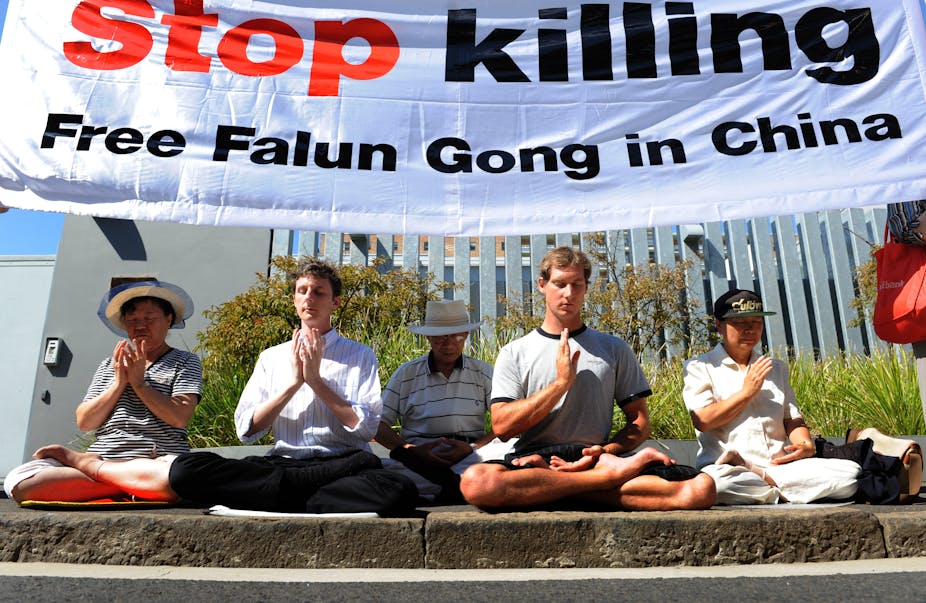UPDATE: The Chinese nationals have now elected to stay in Australia, where they will seek asylum.
A group of ten Chinese people fleeing persecution in their home country has presented Australian authorities with an unusual dilemma – they are not seeking asylum here.
The Falun Gong members, currently aboard a yacht in Darwin harbour, are intent on continuing their voyage to New Zealand, where they say they want to claim asylum on grounds of religious persecution.
Prime minister Julia Gillard says there is no way to prevent the group from travelling to New Zealand as they are not seeking asylum in Australia and are aboard a seaworthy vessel. But concerns remain about the ability of the vessel to negotiate the treacherous waters separating Australia and New Zealand.
The opposition says it’s a case of asylum seekers “country shopping” and “abusing” the international refugee system.
The Conversation spoke with Murdoch University’s refugee law expert Mary Anne Kenny about where the law stands on this unique set of circumstances.
What are Australia’s legal obligations towards the Chinese group in Darwin?
Australia is a signatory to the United Nations Refugee Convention in relation to the status of refugees. That means if a person arrives in Australian territory claims protection from Australia, they can’t be sent back to their country of origin because they fear persecution, in this case religious persecution as I understand it.
Australia has an obligation not to return those people to a place where they would face persecution, normally that would be their country of origin, if they have found them to be refugees. If a person comes here seeking protection, Australia must set in train a process for evaluating that claim.
Now as I understand it from what I’ve read in the media, these individuals, I won’t say they’re refugees at the moment because that has not been determined, they haven’t asked Australia to take that action.
Is this an unusual case?
It is an unusual situation. The Refugee Convention normally operates on the basis that someone is seeking the protection of the country. In this case, they are seeking protection from persecution but they don’t wish to seek protection in Australia, they would like to seek protection in New Zealand.
What rights do asylum seekers have to choose their country of asylum? Is there legal precedent for this situation?
Many asylum seekers and refugees will travel through countries in order to seek asylum in a particular country. I wouldn’t say it’s correct to say they have a legal right to determine which country they go to. But every country, if a person presents there and they seek asylum, has an obligation not to return that person to a country where they would face persecution.
There are many reasons why asylum seekers and refugees will travel through or seek out a particular destination. That may be because they perceive there is a particular benefit there. But that’s a bit simplistic. I know that’s the argument that has been put forward. But often there are other reasons why they’re going to a particular country, it may be that they have family members there or something else that motivates them to go to that particular country.
When you have people in desperate situations looking for some kind of solution, it’s obviously much more complex than suggesting they’re just trying to get to the country with the best outcome. Obviously they’re looking for a place where they can get protection.
Australia and New Zealand are seen as countries that respect human rights. I would hope that we don’t, as a deterrent or to send a message, treat people who try to come here inhumanely.
Is there are moral obligation to prevent them from risking the journey?
From what I have read, I’m not sure about the specific state of their vessel or the conditions. But I gather there are serious concerns that if they are allowed to continue on that they are risking their lives in doing so.
And of course, many asylum seekers and refugees who are fleeing will be in dangerous situations, that’s the nature of refugee movement.
But as I understand, the UNHCR, the Australian government and the New Zealand government are trying to work together to convince them that it’s probably the best option that they remain in Australia. After all, we really do have a very similar system of processing refugees and asylum seekers in Australia and New Zealand.
It’s not a comparable situation to people leaving Indonesia trying to come to Australia. Because they’re protection space in those countries is extremely limited. Whereas in Australia we are a signatory to the convention, we do have a system for processing refugees.
There are differences in terms of the processes between the two countries but I wouldn’t think it would be significant enough for them to risk that on-going journey.
Do many refugees attempt this journey by boat to New Zealand or is it too dangerous?
I don’t think New Zealand experiences a high number of arrivals just because the sheer difficulty in entering New Zealand territory.
Australia has Christmas Island and Ashmore reef which are located quite close to Indonesia. Whereas to make a trip to New Zealand is quite a significant distance.
There’s a very great distance and disincentive for people to come to Australia as well. Our numbers globally are extremely low, 6,000-odd coming a year where as you’re looking at tens of thousands going to other countries in Europe for example.
So Australia has a very low arrival rate, but I think New Zealand would have a lower rate of arrivals than us. Despite those significant pull factors in terms of being a country that has a good refugee system for processing people.

